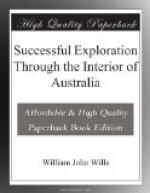as we could, carrying as much water as possible, to
be drunk on the way. After searching about in
order to be sure that the camels had gone home, we
started at about half-past seven, and were lucky enough
to find a creek with some water in it about ten miles
on, where we remained until evening; for it is dry
work travelling in the middle of the day, with the
thermometer varying from 90 to 105 degrees in the shade,
and about 140 degrees in the sun. Well, we started
again in the evening and walked until between nine
and ten P.M.; and again at three A.M. and pushed on
until midday. We then went on from five P.M.,
as before, until nine P.M.; and then from two A.M.,
and reached the camp at nine A.M., having walked more
than eighty miles in rather less than fifty hours,
including sleeping, feeding, and all stoppages.
We found no water all the way, except what I have
mentioned above, so that, as you may imagine, we ran
rather short towards the end of our journey, having
not quite half a pint left between us. When we
stopped to rest the second night, it had been blowing
a hot wind all day, with the thermometer at 107 degrees
in the shade. This made us require more water
than usual. I can assure you there is nothing
like a walk of this sort to make one appreciate the
value of a drink of cold water. We feel no inclination
for anything else, and smack our lips over a drop
such as you would not think of tasting, with as much
relish as ever any one did over the best sherry or
champagne. I have enjoyed myself so far.
It is now nearly four months since we left Melbourne,
and you will see by the map that we are about half-way
across the continent. I hope by the time that
this reaches you we shall not only have been entirely
across, but back here again, and possibly on our way
to Melbourne. There is no probability of the
expedition lasting two or three years. I expect
to be in town again within twelve months from the time
of starting. I enclose a few chrysanthemums from
the Australian desert. I know you will highly
prize them. To give you an idea of Cooper’s
Creek, fancy extensive flat, sandy plains, covered
with herbs dried like hay, and imagine a creek or
river, somewhat similar in appearance and size to
the Dart above the Weir, winding its way through these
flats, having its banks densely clothed with gum trees
and other evergreens:—so far there appears
to be a considerable resemblance, but now for the
difference. The water of Cooper’s Creek
is the colour of flood-water in the Dart; the latter
is a continuous running stream; Cooper’s Creek
is only a number of waterholes. In some places
it entirely disappears, the water in flood-time spreading
all over the flats and forming no regular channel.
The flies are very numerous, so that one can do nothing
without having a veil on; and whilst eating the only
plan is to wear goggles.
. . .
His next letter is written with ink:—
December 15th.
Dear Bessy,




